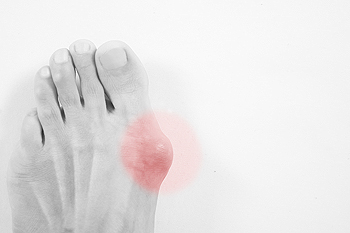 Bunions, otherwise recognized as a deformity of the big toe, can be incredibly painful when left untreated. They may easily be diagnosed by looking for a bony protrusion on the side of the big toe, and are typically more common among women and elderly patients. However, there are many reasons why someone may develop a bunion, one of those reasons being genetics. Another contributing factor may have to do with your shoes. Those who commonly wear constraining footwear, such as high heels, or cowboy boots, for extended periods of time may be more likely to develop a bunion. Injuries to the foot, as well as arthritis, can both increase your risk of developing a bunion. To help find relief from the pain bunions typically cause, it is suggested that you wear custom orthotics. For more information on treating bunions and how orthotics may help, please consult with a podiatrist for professional care.
Bunions, otherwise recognized as a deformity of the big toe, can be incredibly painful when left untreated. They may easily be diagnosed by looking for a bony protrusion on the side of the big toe, and are typically more common among women and elderly patients. However, there are many reasons why someone may develop a bunion, one of those reasons being genetics. Another contributing factor may have to do with your shoes. Those who commonly wear constraining footwear, such as high heels, or cowboy boots, for extended periods of time may be more likely to develop a bunion. Injuries to the foot, as well as arthritis, can both increase your risk of developing a bunion. To help find relief from the pain bunions typically cause, it is suggested that you wear custom orthotics. For more information on treating bunions and how orthotics may help, please consult with a podiatrist for professional care.
If you are suffering from bunion pain, contact Dr. Michael E. Newman of Pennsylvania. Our doctors can provide the care you need to keep you pain-free and on your feet.
What Is a Bunion?
Bunions are painful bony bumps that usually develop on the inside of the foot at the joint of the big toe. As the deformity increases over time, it may become painful to walk and wear shoes. Women are more likely to exacerbate existing bunions since they often wear tight, narrow shoes that shift their toes together. Bunion pain can be relieved by wearing wider shoes with enough room for the toes.
Causes
- Genetics – some people inherit feet that are more prone to bunion development
- Inflammatory Conditions - rheumatoid arthritis and polio may cause bunion development
Symptoms
- Redness and inflammation
- Pain and tenderness
- Callus or corns on the bump
- Restricted motion in the big toe
In order to diagnose your bunion, your podiatrist may ask about your medical history, symptoms, and general health. Your doctor might also order an x-ray to take a closer look at your feet. Nonsurgical treatment options include orthotics, padding, icing, changes in footwear, and medication. If nonsurgical treatments don’t alleviate your bunion pain, surgery may be necessary.
If you have any questions, please feel free to contact one of our offices located in Plymouth Meeting and Ambler, PA. We offer the newest diagnostic and treatment technologies for all your foot care needs.
Read more about What Are Bunions?